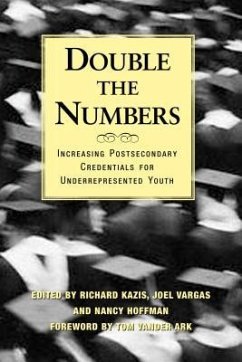Only 25 percent of the U.S. high school students complete any college degree. Among African American youth, only 18 percent earn a baccalaureate by age twenty-nine. For Hispanic Americans, the figure is a mere 10 percent. The United States urgently needs to address this problem. For reasons of intellectual and professional opportunity, economic efficiency, and social equity, the nation must do a better job of preparing young people not only to enter college, but also to earn credentials that are key to professional and economic success. Double the Numbers highlights emerging strategies--at state, district, and school levels--for improving postsecondary outcomes. High schools pose special challenges in this regard: how to motivate older adolescents in school settings; how to overcome the rigidities of high school schedules and routines; how to prepare students for smooth transitions to postsecondary learning and success. This book explores policies that are likely to serve as building blocks in any "next phase" of education reform that tackles the dual problems of high school completion and postsecondary access and success. Leading figures in education reform--including Kati Haycock, Robert Schwartz, and Marc Tucker--address these issues and propose changes in the design of high schools and colleges. They also focus on state policy, since to double the numbers of students attaining postsecondary credentials within a decade will require aggressive innovation by states. Finally, they consider how opportunity and outcomes vary by race, ethnicity, and gender, and examine the implications of these variations for policy and practice. Double the Numbers will prove indispensible to those who are framing strategies for this next great school reform effort. "There is nothing more important in today's economy than the preparation of ALL of our youth for the competitive jobs of the future. Kudos to all of the contributors to this work." -- Governor Mark R. Warner, Virginia "Double the Numbers contains many thoughtful ideas about how to begin to meet the urgent challenge of increasing the numbers of low-income and minority youth earning postsecondary credentials. Anyone interested in this critical aspect of education policy and practice will find much of interest in this volume." -- Honorable Secretary Richard Riley, Former U.S. Secretary of Education "Double the Numbers is an invaluable resource to guide education communities in ensuring that higher education is a viable and desirable option for all students. This collection defines expectations, structures, and practices that will need to take shape if all students are to achieve academic success." -- Stanley G. Jones, Commissioner, Indiana Commission for Higher Education "Double the Numbers is a rich resource as well as a passionate call to action that should be of value to both practitioners and policymakers." -- Dr. Alfredo De Los Santos Jr., Research Professor, Hispanic Research Institute, Arizona State University Richard Kazis is senior vice president of Jobs for the Future, where he leads its policy and research efforts. Joel Vargas, a senior project manager at Jobs for the Future, works with the Early College High School Initiative. Nancy Hoffman is a vice president at Jobs for the Future, where she leads activities for the Early College High School Initiative. Tom Vander Ark is executive director of the Bill & Melinda Gates Foundation's education initiatives.
Bitte wählen Sie Ihr Anliegen aus.
Rechnungen
Retourenschein anfordern
Bestellstatus
Storno



